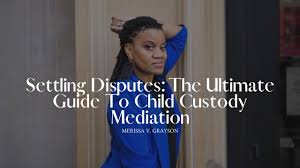
The Benefits of Custody Mediation in Resolving Family Disputes
Custody mediation is a process that can be incredibly beneficial for families going through disputes over child custody arrangements. Rather than resorting to lengthy and often emotionally draining court battles, mediation offers a more collaborative and amicable approach to resolving conflicts.
Effective Communication
One of the key benefits of custody mediation is that it promotes effective communication between parents. A trained mediator helps facilitate discussions, ensuring that both parties have the opportunity to express their concerns and preferences in a controlled and respectful environment.
Focused on the Best Interests of the Child
Mediation places a strong emphasis on the best interests of the child involved in the custody dispute. By working together to create a parenting plan that prioritizes the well-being of the child, parents can ensure that their decisions are centered around what is most beneficial for their son or daughter.
Cost-Effective and Time-Efficient
Compared to traditional litigation, custody mediation is often more cost-effective and time-efficient. By avoiding lengthy court proceedings, families can reach agreements more quickly and with fewer legal expenses, allowing them to focus on moving forward with their lives.
Preserving Relationships
Custody mediation also helps preserve relationships between parents and children. By fostering cooperation and mutual understanding, mediation can create a more positive co-parenting dynamic that benefits everyone involved, especially the child at the center of the dispute.
Empowering Parents
Through mediation, parents are empowered to take an active role in shaping their custody arrangements rather than having decisions imposed upon them by a judge. This sense of ownership can lead to more sustainable agreements that are tailored to the unique needs of each family.
In conclusion, custody mediation offers numerous benefits for families navigating challenging custody disputes. By promoting communication, focusing on the child’s best interests, being cost-effective and time-efficient, preserving relationships, and empowering parents, mediation provides a constructive path towards resolving conflicts in a way that prioritizes collaboration and understanding.
Understanding Custody Mediation: Common Questions and Answers
- What is custody mediation and how does it work?
- What are the benefits of choosing custody mediation over litigation?
- How long does custody mediation typically take to reach an agreement?
- Is custody mediation confidential, and what information is shared during the process?
- What qualifications and training do custody mediators have?
What is custody mediation and how does it work?
Custody mediation is a process designed to help parents resolve disputes regarding child custody and visitation arrangements in a collaborative and constructive manner. During mediation, a neutral third-party mediator facilitates discussions between the parents, guiding them towards reaching mutually agreeable solutions. The mediator helps parents communicate effectively, identify common goals, and work together to create a parenting plan that prioritizes the best interests of the child. Through open dialogue and problem-solving techniques, custody mediation aims to empower parents to make informed decisions about their children’s care and well-being outside of court proceedings.
What are the benefits of choosing custody mediation over litigation?
When considering the benefits of choosing custody mediation over litigation, it becomes evident that mediation offers a more collaborative and child-centered approach to resolving disputes. Unlike litigation, which can be adversarial and costly, mediation promotes effective communication between parents, prioritizes the best interests of the child, and empowers parents to actively participate in creating a parenting plan that suits their unique family dynamics. Additionally, custody mediation is often more time-efficient and cost-effective than going through the court system, allowing families to reach agreements faster and with less financial strain. By opting for mediation, parents can preserve relationships, foster cooperation, and ultimately create a more positive co-parenting environment that benefits both themselves and their children in the long run.
How long does custody mediation typically take to reach an agreement?
The duration of custody mediation can vary depending on the complexity of the case, the willingness of both parties to cooperate, and the specific circumstances involved. In general, custody mediation sessions are scheduled over a series of meetings, often ranging from a few weeks to several months. The goal is to allow both parents ample time to discuss their concerns, explore possible solutions, and ultimately reach a mutually agreeable custody arrangement. While some cases may be resolved relatively quickly within a few sessions, others may require more time and multiple meetings to address all issues thoroughly and ensure that the final agreement is comprehensive and satisfactory for both parties.
Is custody mediation confidential, and what information is shared during the process?
During custody mediation, confidentiality is a crucial aspect that ensures a safe and open environment for both parents involved. Information shared during the mediation process is typically kept confidential, meaning that discussions, agreements, and any personal details disclosed during sessions are not shared outside of the mediation setting. This confidentiality allows parents to speak openly and honestly without fear of their words being used against them in court proceedings. The mediator acts as a neutral party who facilitates discussions and helps parents reach mutually agreeable solutions while maintaining the privacy of the information exchanged during the sessions.
What qualifications and training do custody mediators have?
Custody mediators typically have specialized qualifications and training to effectively facilitate discussions and negotiations between parents in custody disputes. Mediators often have backgrounds in law, social work, psychology, or conflict resolution. Many mediators undergo specific training programs that focus on mediation techniques, communication skills, child development, family dynamics, and legal aspects of custody agreements. Additionally, custody mediators are required to adhere to ethical guidelines and standards set by professional mediation organizations to ensure they maintain a neutral and impartial stance while assisting parents in reaching mutually beneficial agreements for the well-being of their children.
